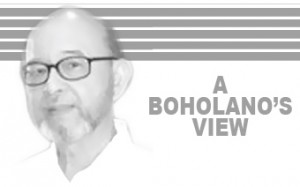In its June 2015 update the Oxford English Dictionary (OED) included 40 Filipino or P-Noy terms—compound words and uniquely Philippine usage of English words. This was reported in the Philippine Daily Inquirer and the Philippine Star on June 26, 2015.
The Oxford English Dictionary is recognized as the world’s “definitive record of the English language.â€
“Philippine English†is recognized. The latest announcement of the Oxford English Dictionary was also the first time that the OED used the term “Philippine Englishâ€: according to Danica Salazar, a Filipino lexicographer based in the United Kingdom who works as consultant editor for the OED. She adds: “Philippine English refer to words that are chiefly or exclusively used by Filipinos or in the Philippines.â€
“Becoming part of the OED is a recognition of the role that Philippine English plays in the evolution of the language. Such recognition may also lead to the realization among Filipinos that the liberties we take with English are not aberrations, but rather linguistic innovations that reflect our own cultural experience and contribute to the richness of English:†adds Salazar.
We should be aware that other forms of English are internationally known and respected: Â American English, Irish English, Canadian English, and Australian English.
English is the leading global lingua franca. We mean the language that is used the most internationally or for transnational and global communication and understanding. I believe Spanish is the second leading global lingua franca. Not French.
Ma swerte tayong mga Pilipino na marunong tayo sa English, kaya maraming mga Pinoy na naging Overseas Filipino Workers at professionals. Kaya lang, maraming mga problema din ang dahil dito, katulad ng mga pamilyang na nasisira at nagsakripisyo.Â
Anugon nga gikalimtan na nato ang Kinatsila nga gitun-an ug gigamit sad sa atong katiguwangan (ingon sa akong mga papa ug mama, mga lolo ug lola). Ang akong mga ig-agaw mahibaw magkinatsila kay gitun-an man sila sa ilang mga ginikanan.
Forty (40) was the largest batch of words from Philippine English to be recognized and published at the same time this year. Among them are “mabuhay,†“kuya,†“barong,â€Â “halo-halo,†“pan de sal,†“sinigang,†“baon,†“pulutan,†“bahala na,†“barangay,†“suki,†“balik-bayan,†“sari-sari store,†“presidentiable,†“KKB-kaniya-kaniyang bayad,†“high blood,†“despedida,†“utang na loob,†“estafa,†“barkada,†“kikay,†“buko†for coconut juice.
Why is English the most important global lingua franca? Let me just use three reasons.
One. Not only because English is beautiful, for Spanish, French, German, Binisaya, Tagalog, Ilocano, Bikol, and many other languages are also beautiful and sound good to the ear.
Two. English is a very compact and efficient language, and very many books in English are readily available. Many English words are made up of only one syllable: “peaceâ€, “meâ€, “youâ€, “theyâ€, etc. There are probably many more books—literary, journalistic, scientific, and technical, published in English than in any other language.
Three. English freely borrows and incorporates words from many languages in the world as additional words in the English language.
According to our 1987 Constitution, our Philippine National Language is Filipino. It is not Tagalog, although earlier on President Manuel L. Quezon decided that is should be Tagalog.
In Article XIV of our 1987 Constitution, “Language,†it says: Sec.6. The national language of the Philippines is Filipino. As it evolves, it shall be further developed and enriched on the basis of existing Philippine and other languages.
Subject to provisions of law and as the Congress may deem appropriate, the Government shall take steps to initiate and sustain the use of Filipino as a medium of official communication and as a language of instruction in the educational system.
As the president of the U.P. system of universities (1987-1993), I initiated the multilingual U.P. Language Policy with emphasis on Filipino and the development of all the other regional languages of the Philippines.  We established the U.P. Sentro ng Wikang Filipino to carry out our language policy. I realized that our U.P. campus in Baguio should enrich Filipino with  Ilocano; the Cebu College in U.P. Cebu should enrich Filipino with Sugboanon Binisaya; and the U.P. in the Visayas in Iloilo should enrich Filipino with  Ilonggo.
Unfortunately, our national Komisyon sa Wikang Filipino has used Tagalog as Filipino but has not consciously and deliberately borrowed from and incorporated words and concepts of other Philippine languages to enrich Filipino as our evolving national language.
President B.S. Aquino uses Tagalog in most of his speeches, perhaps on the assumption that Tagalog is Filipino. He would be appreciated if he consciously borrowed words from Ilokano, Bisaya, Bikolano, etc. for use in his speeches.
Our national Komisyon ng Wikang Filipino should realize that our Filipino language as the national language should follow the excellent example of English as the foremost global lingua franca that is forever borrowing words and concepts from many languages around the world.
So Filipino should actively borrow words and concepts from other Philippine languages and foreign languages like English and Spanish. Ang mga Bisaya ay gumagamit ng  Kastila sa pagisip (uno, dos, tres, beinte, sinquenta, sien, libo, milyon; ug uban pa; lungsod (municipio), probinsya, ciudad, reyon, kapital.
My email is pepevabueva@gmail.com

